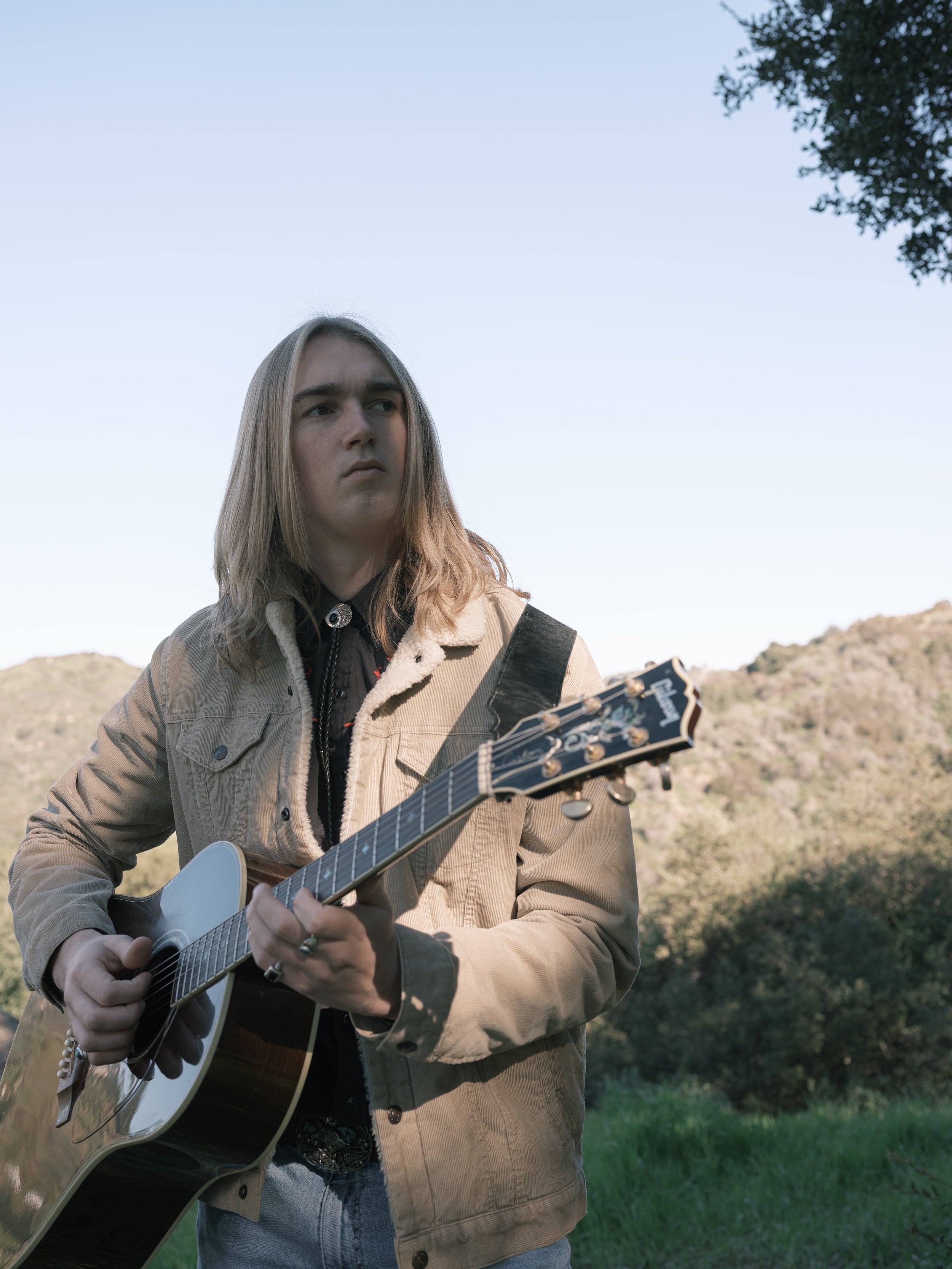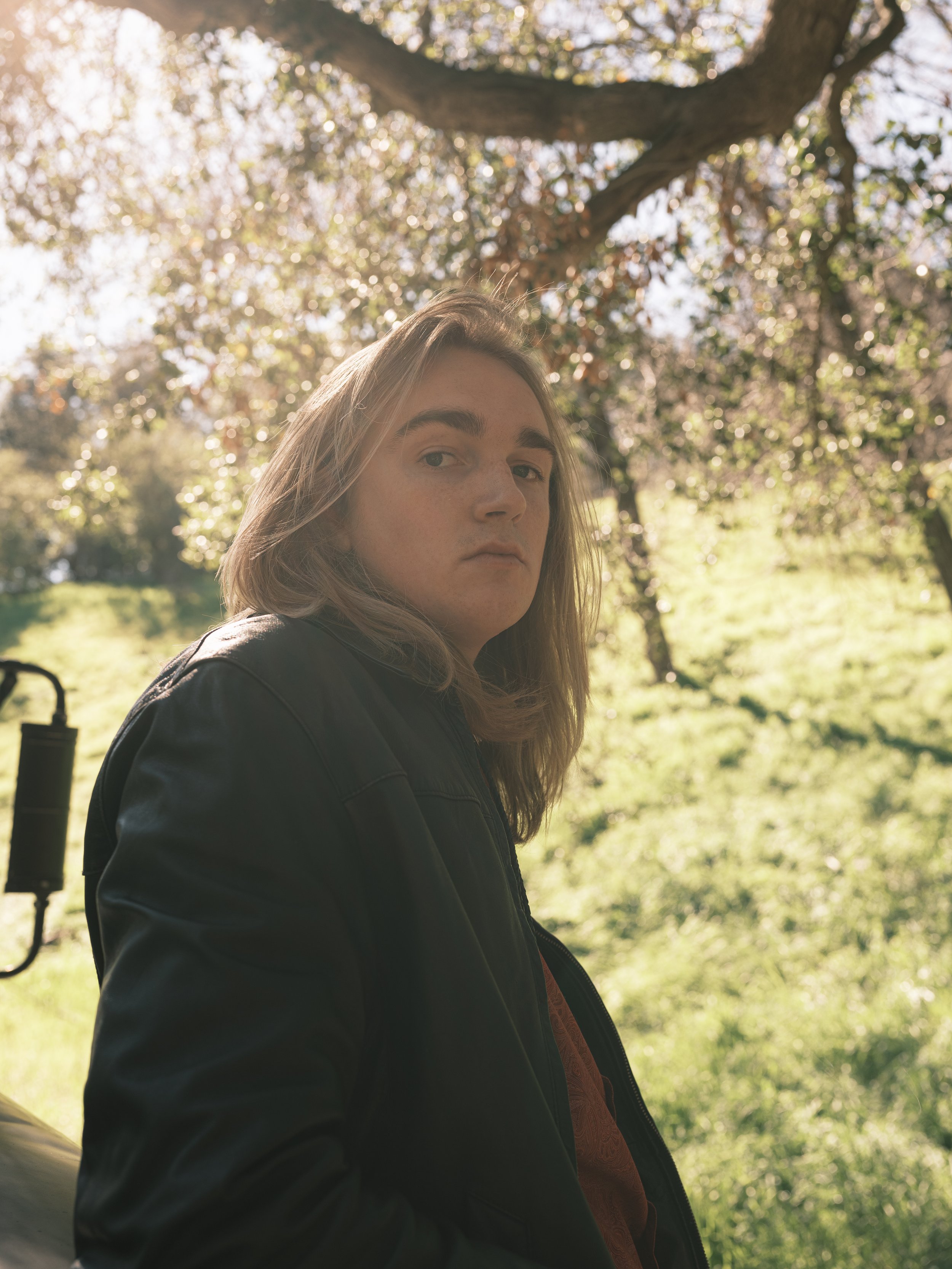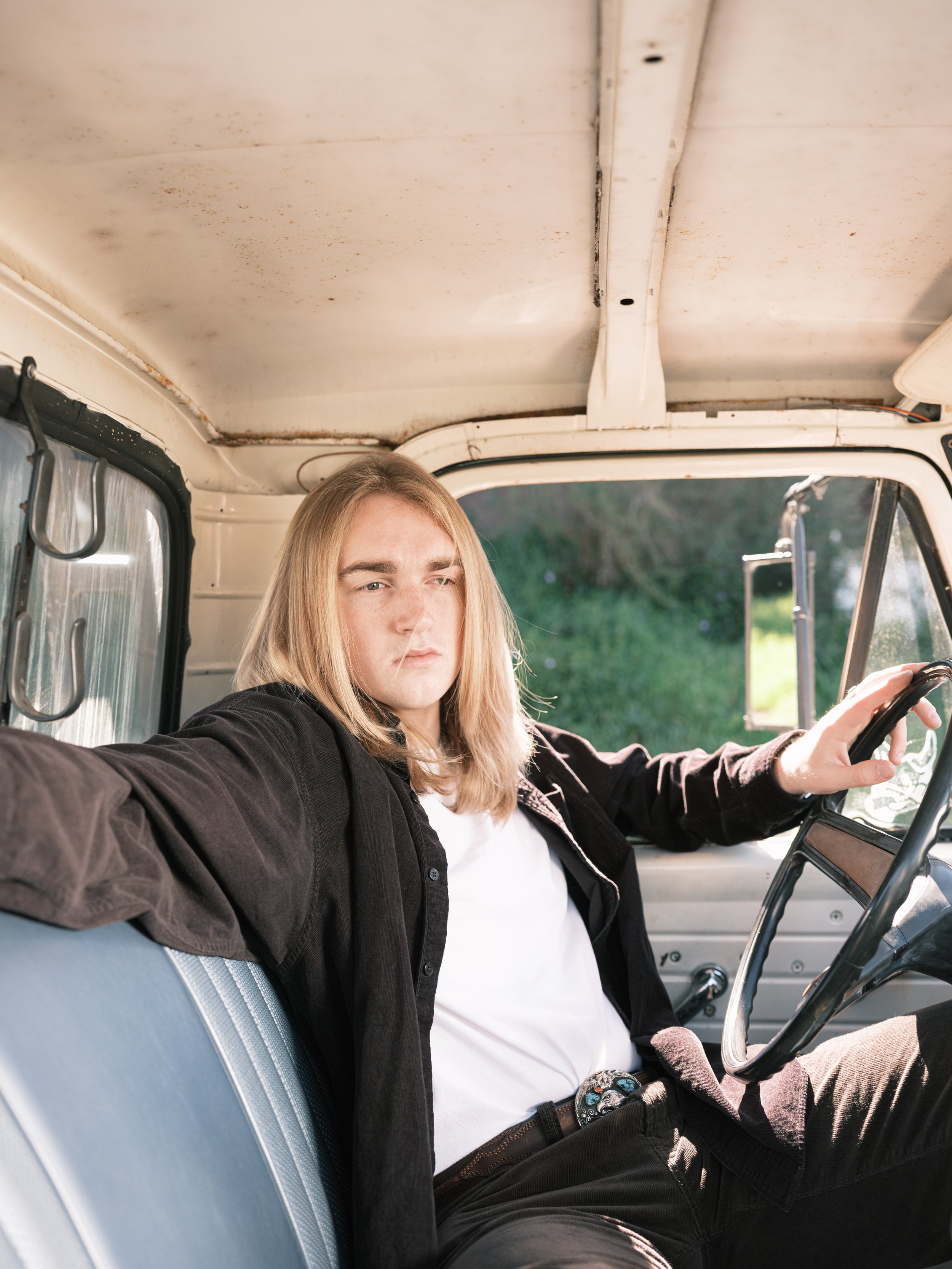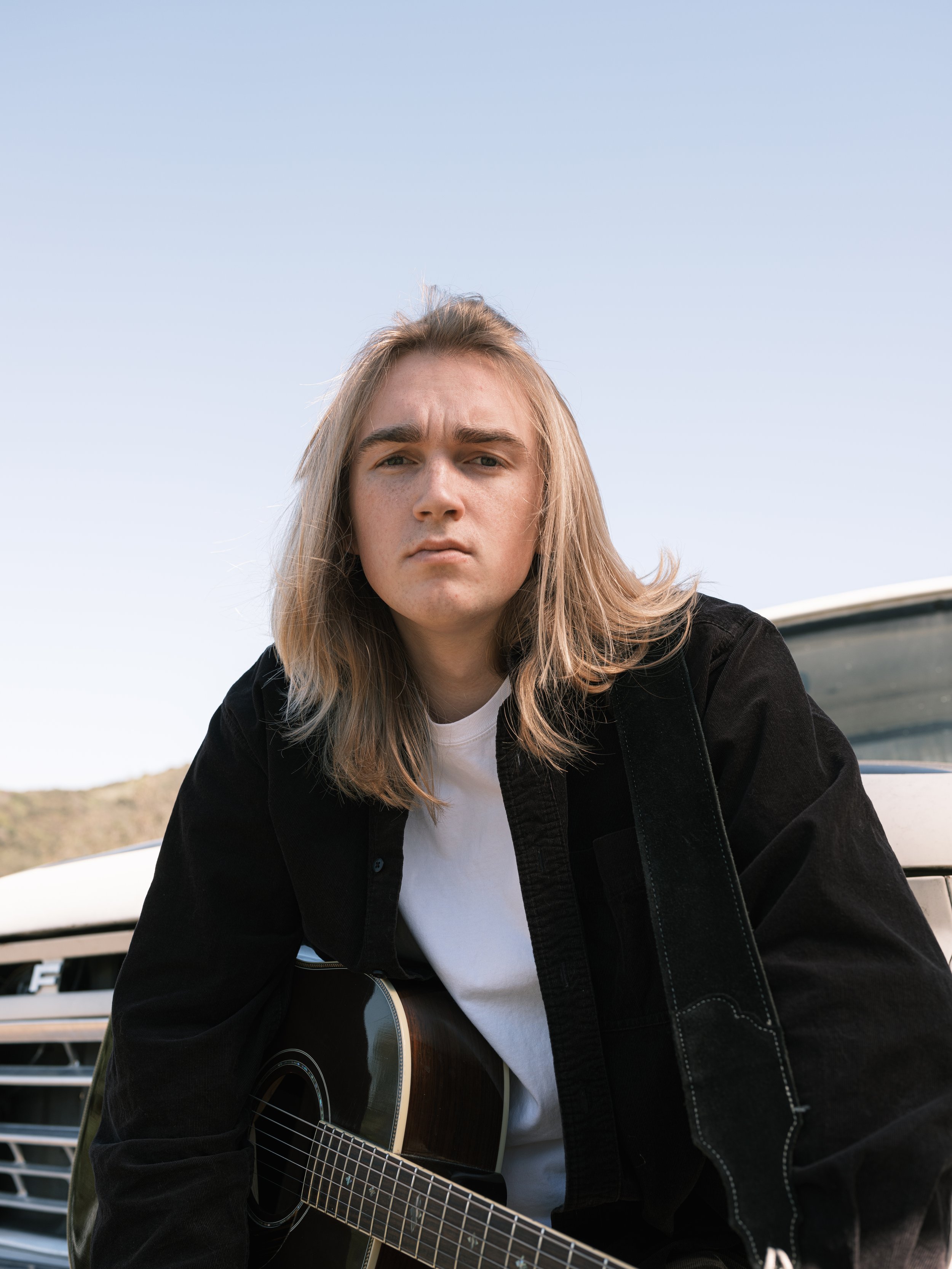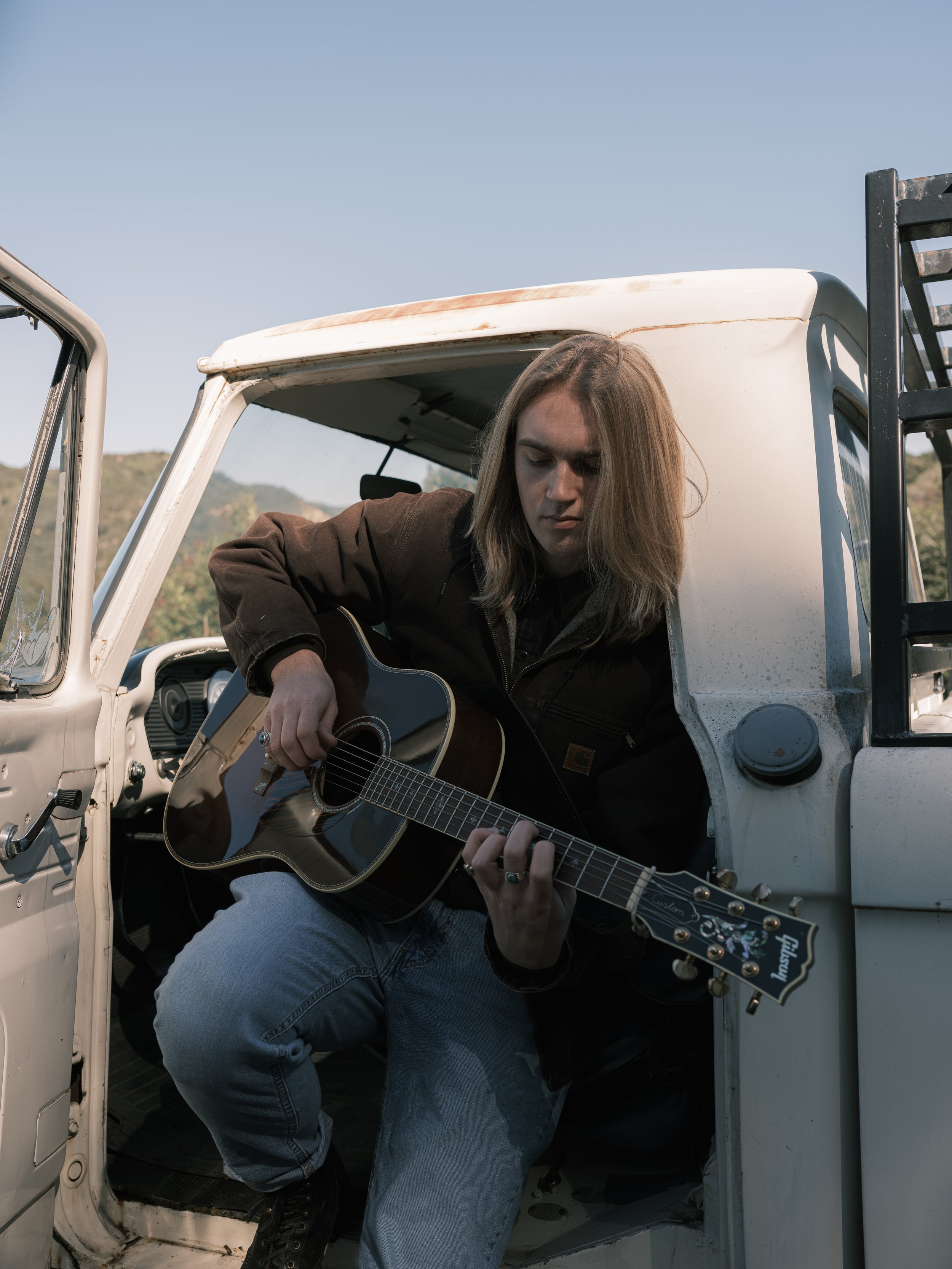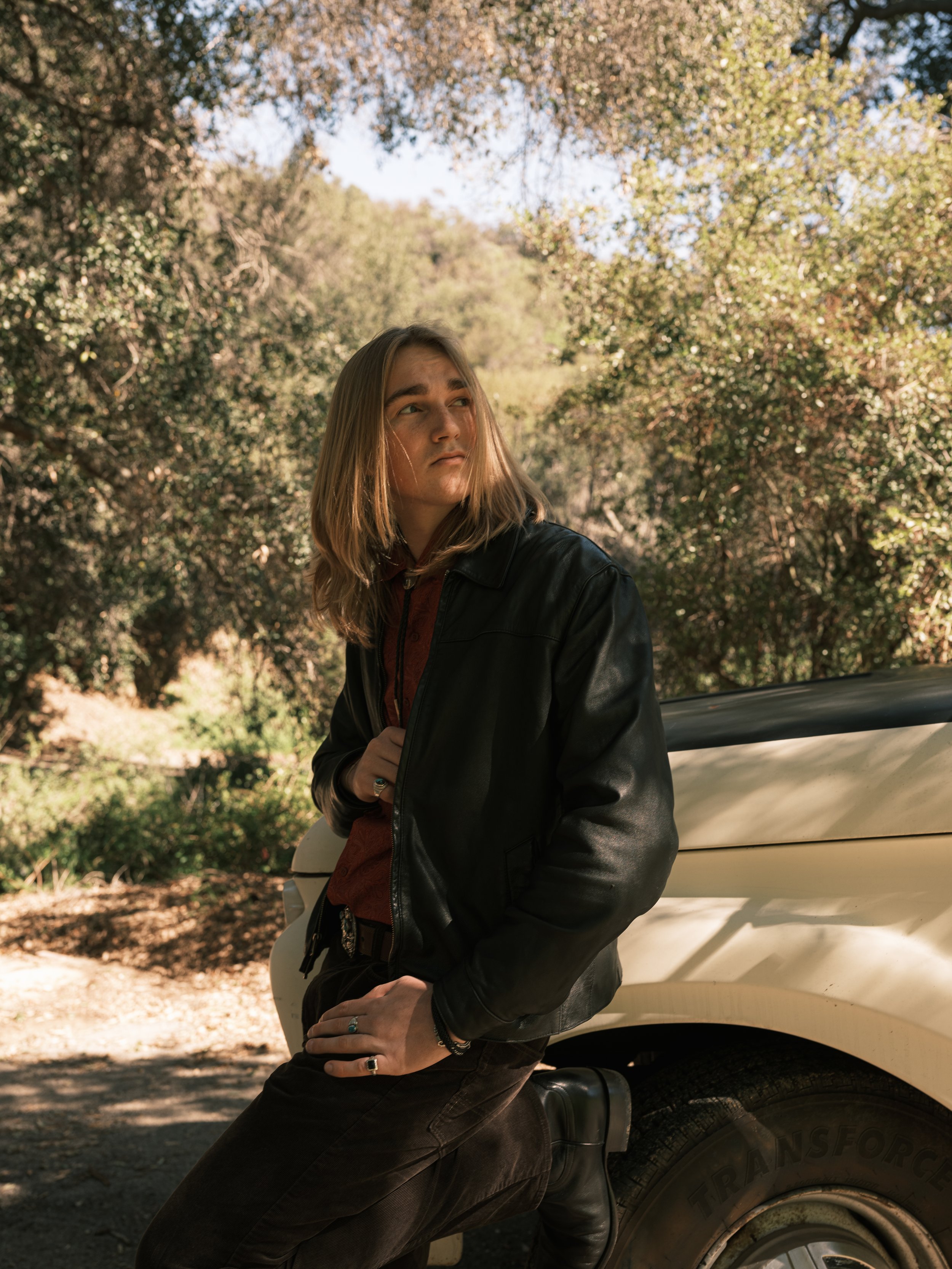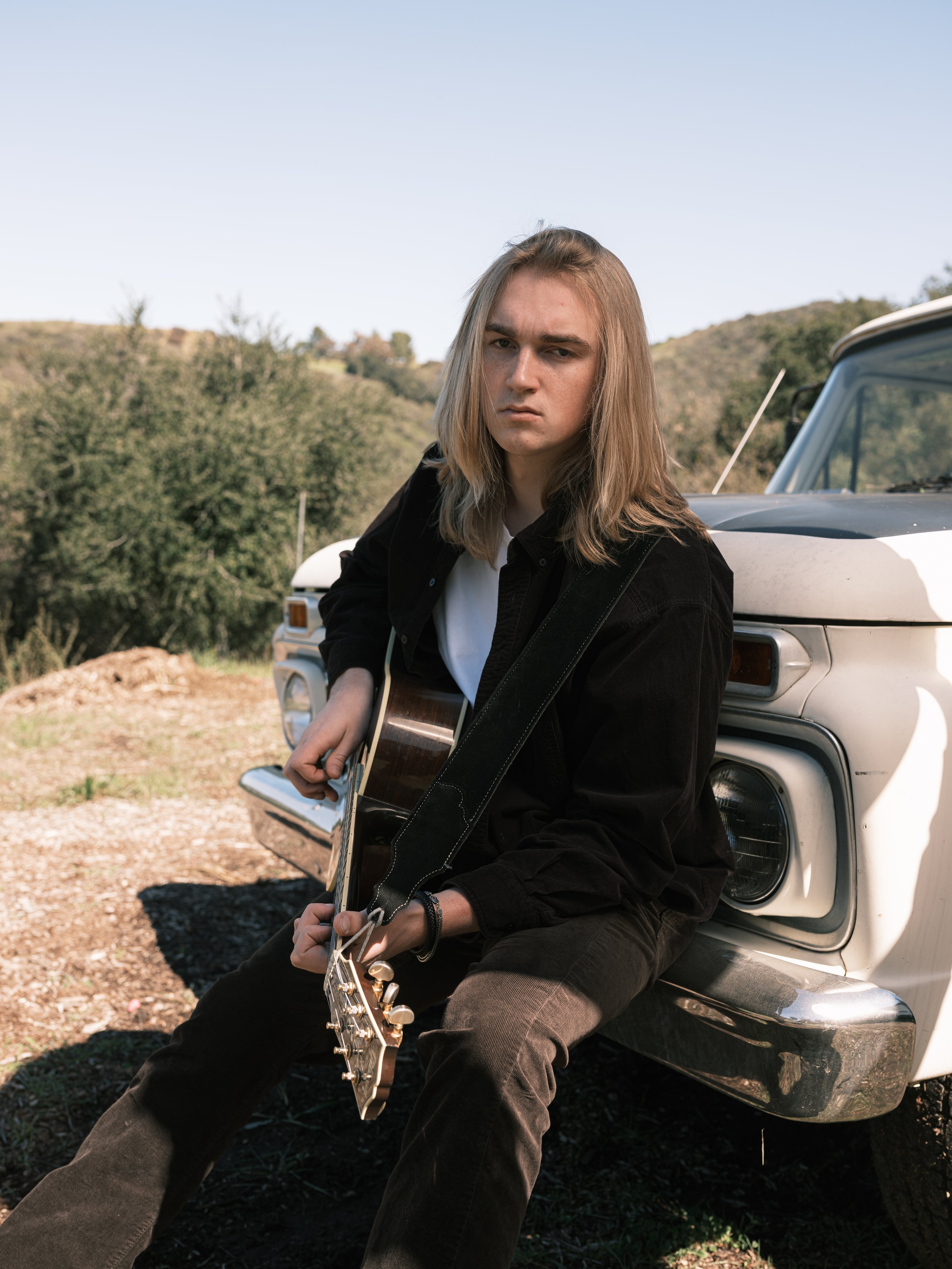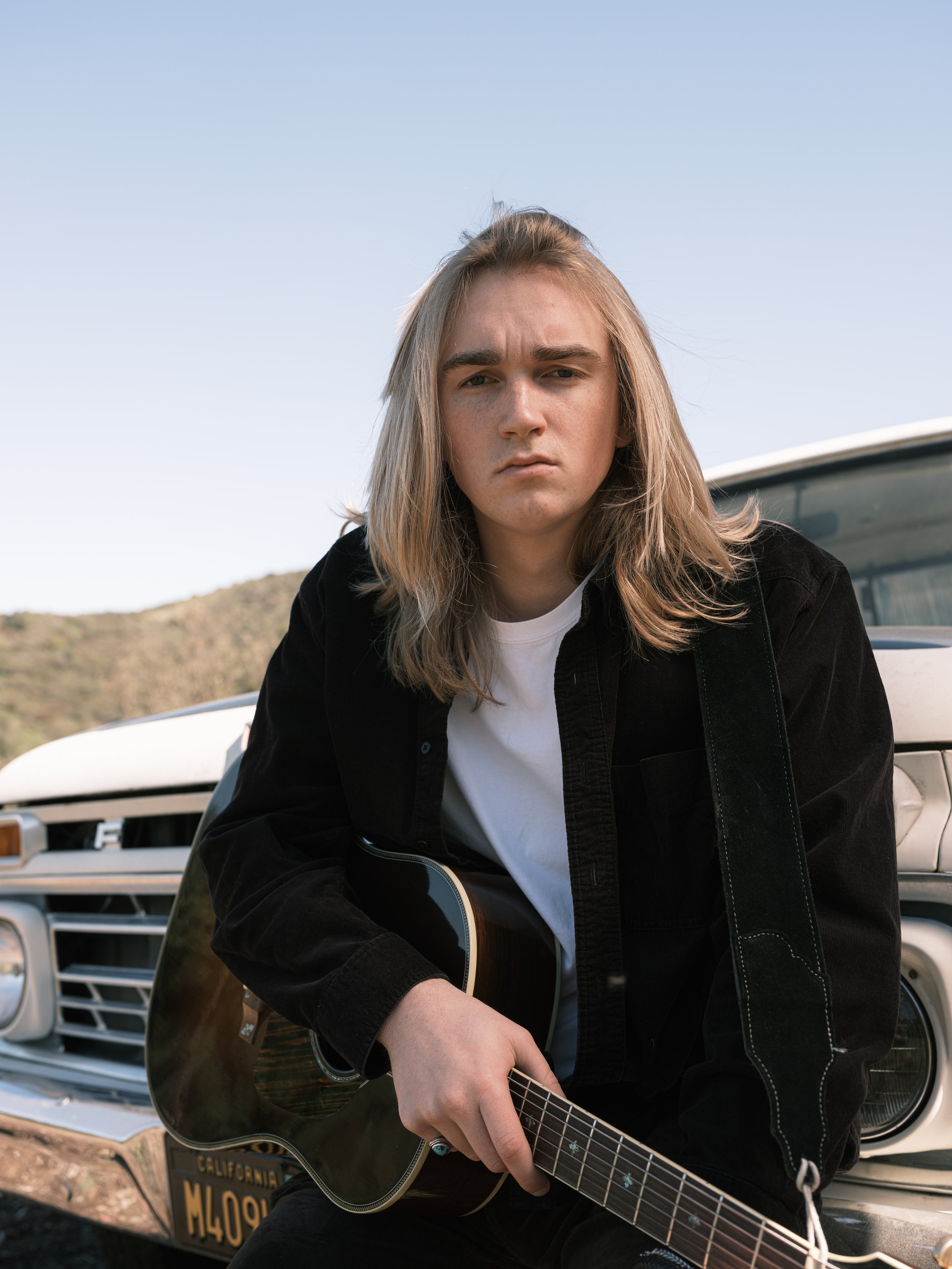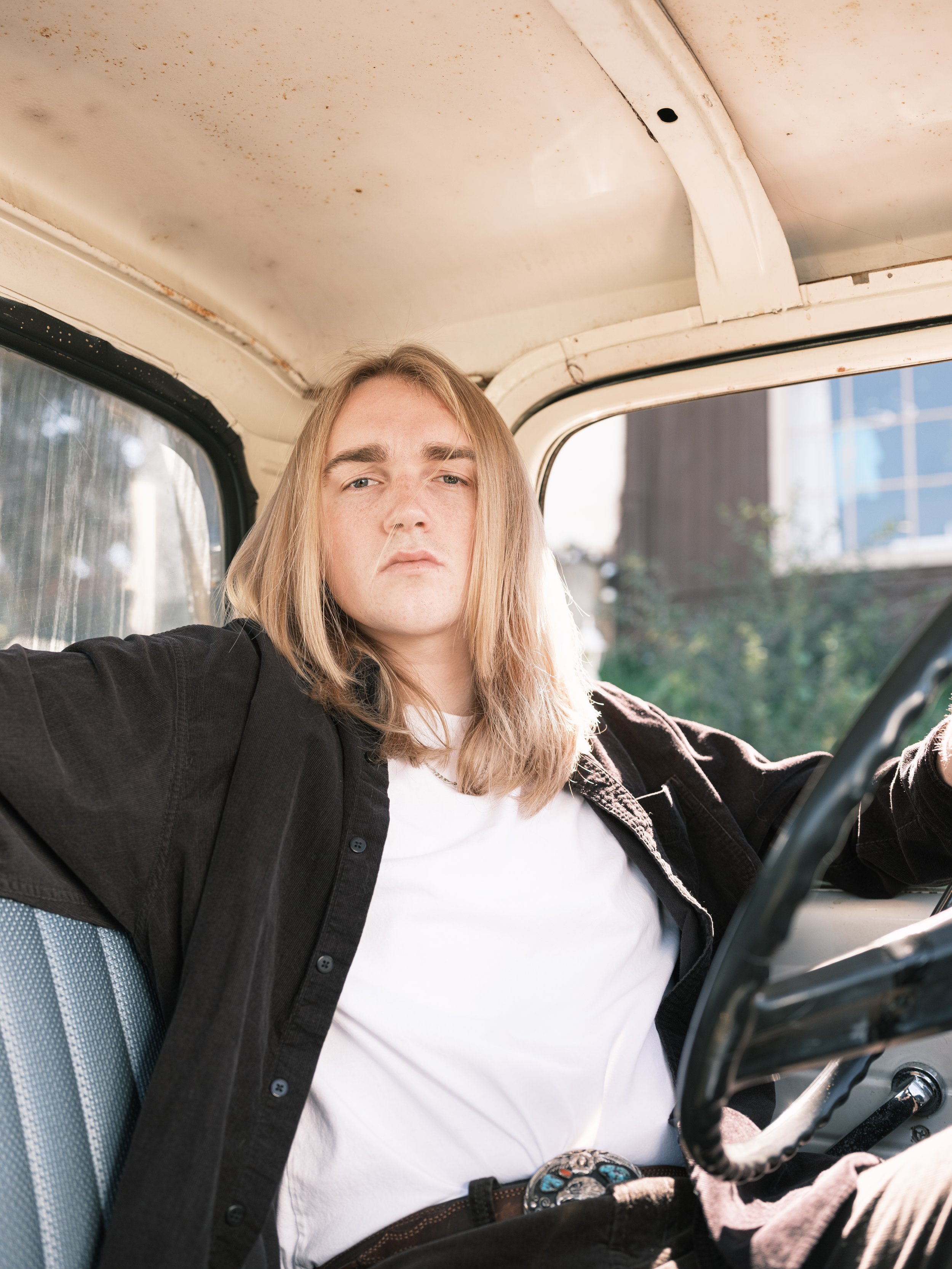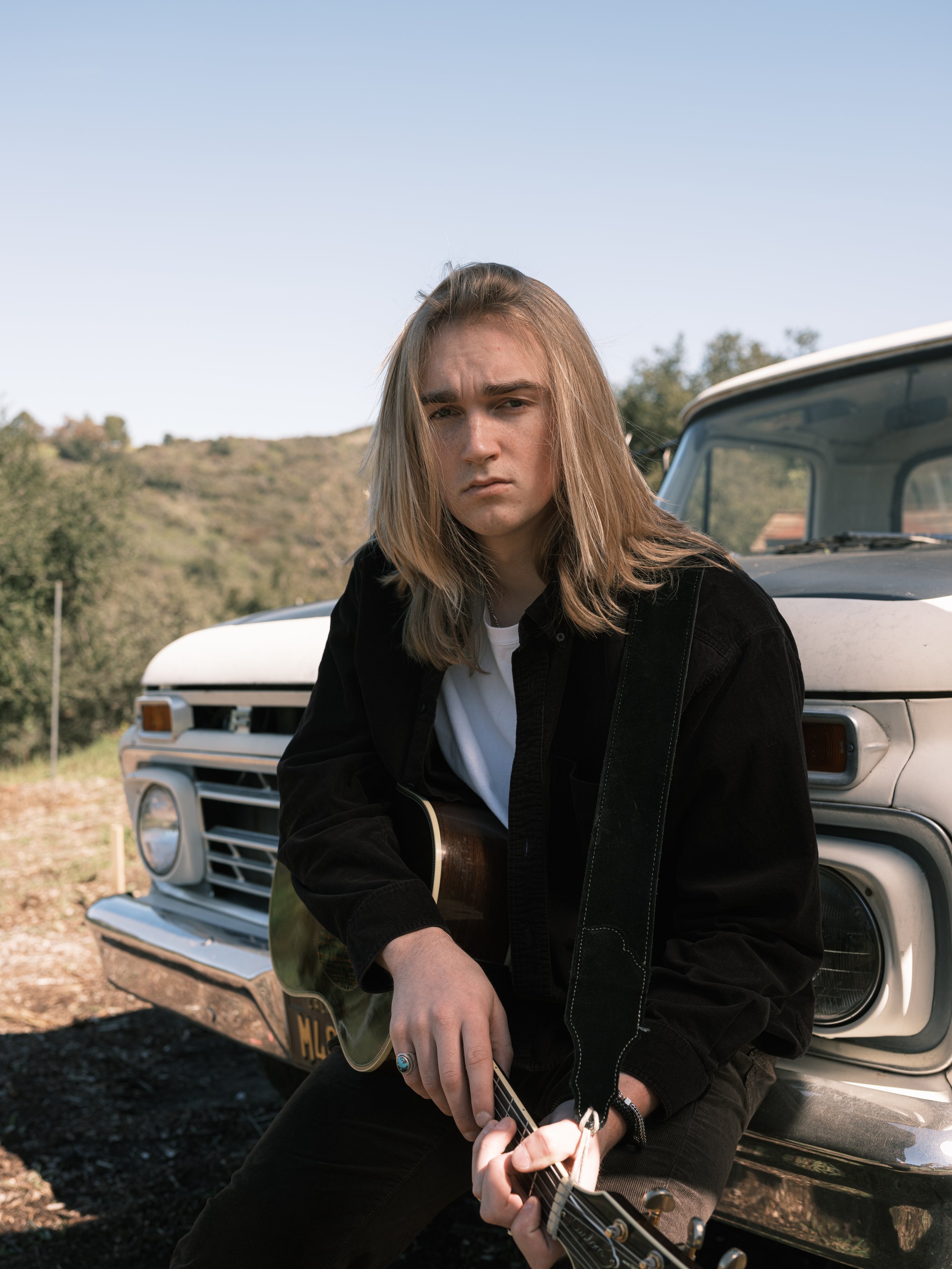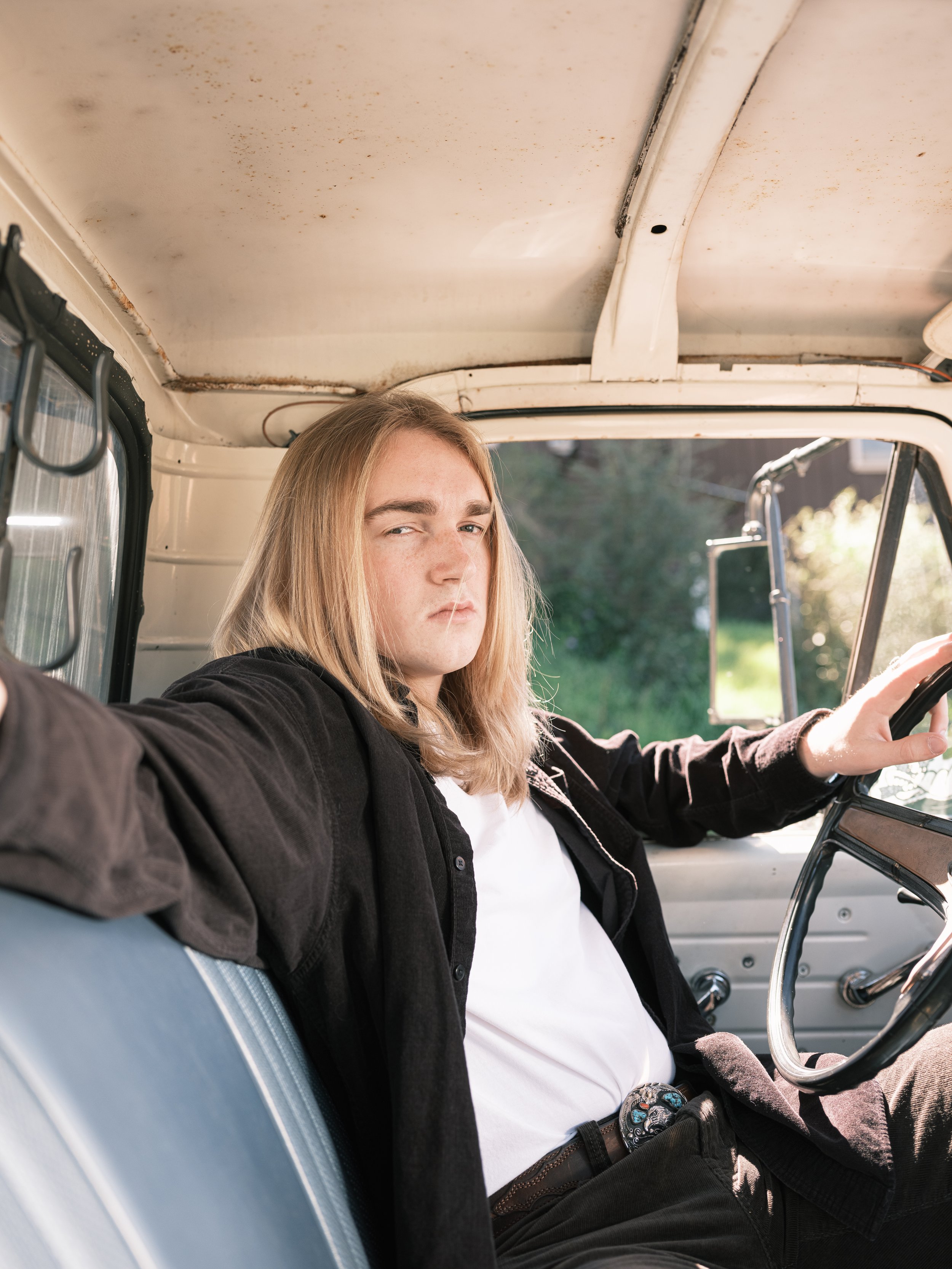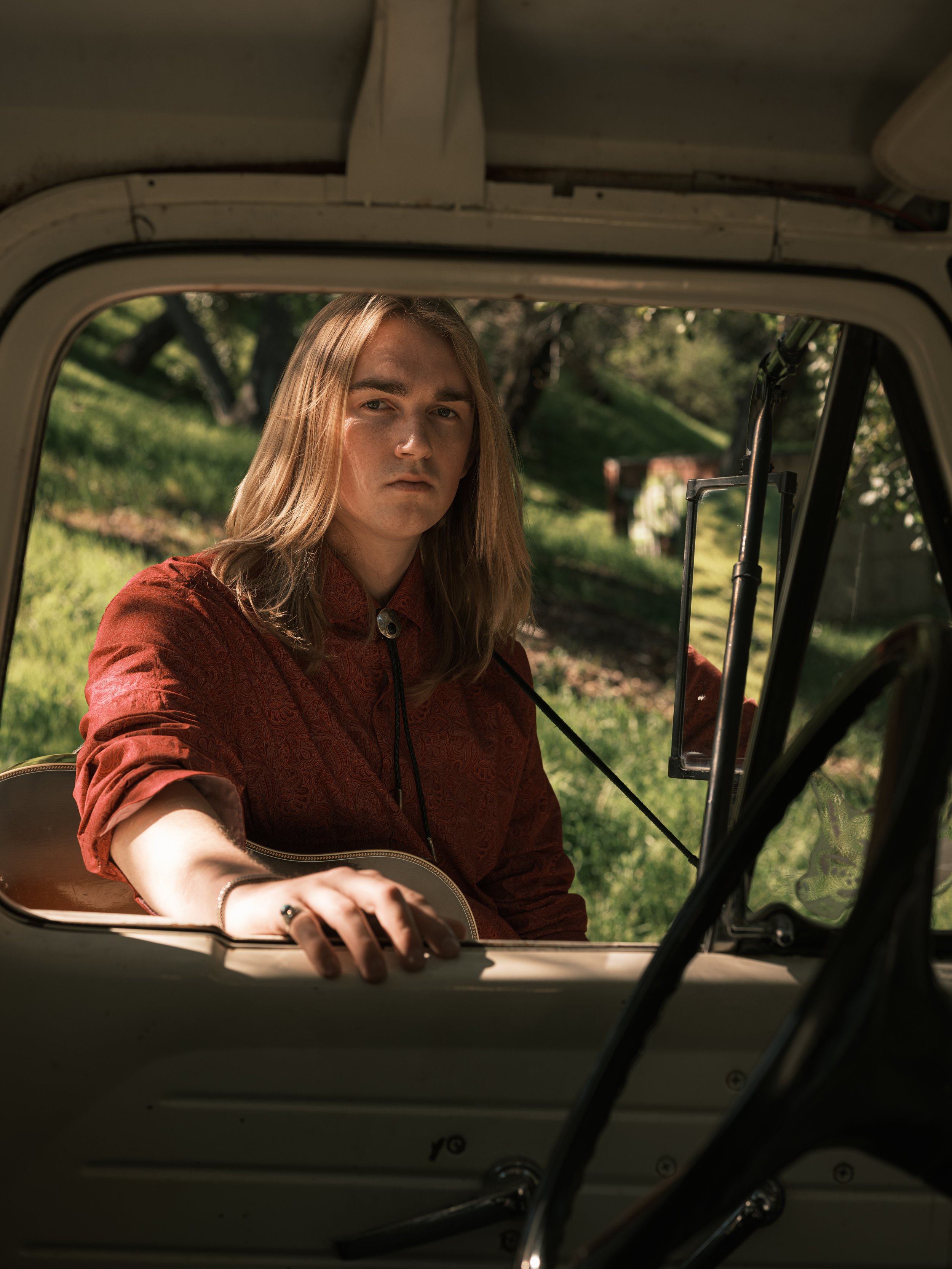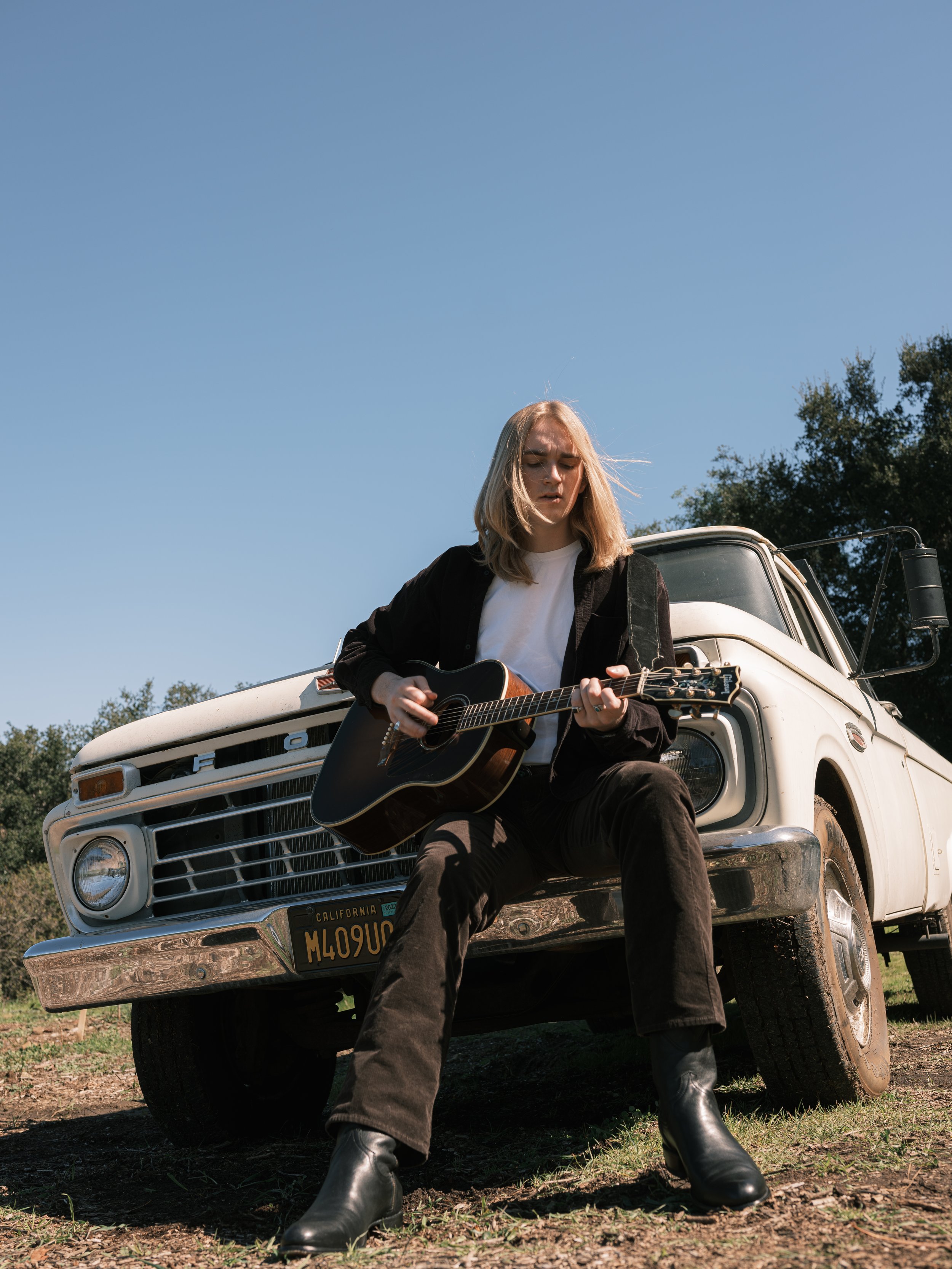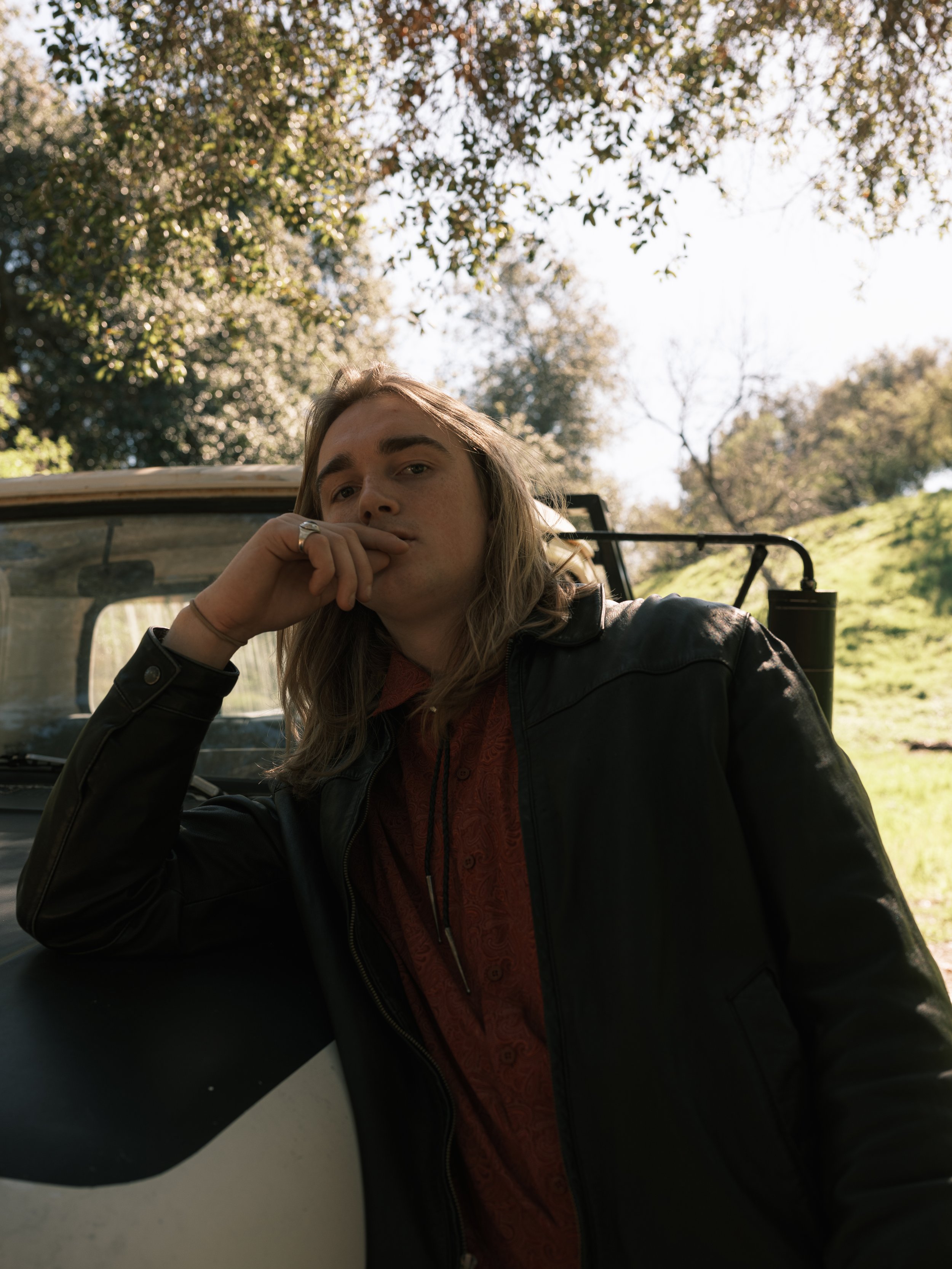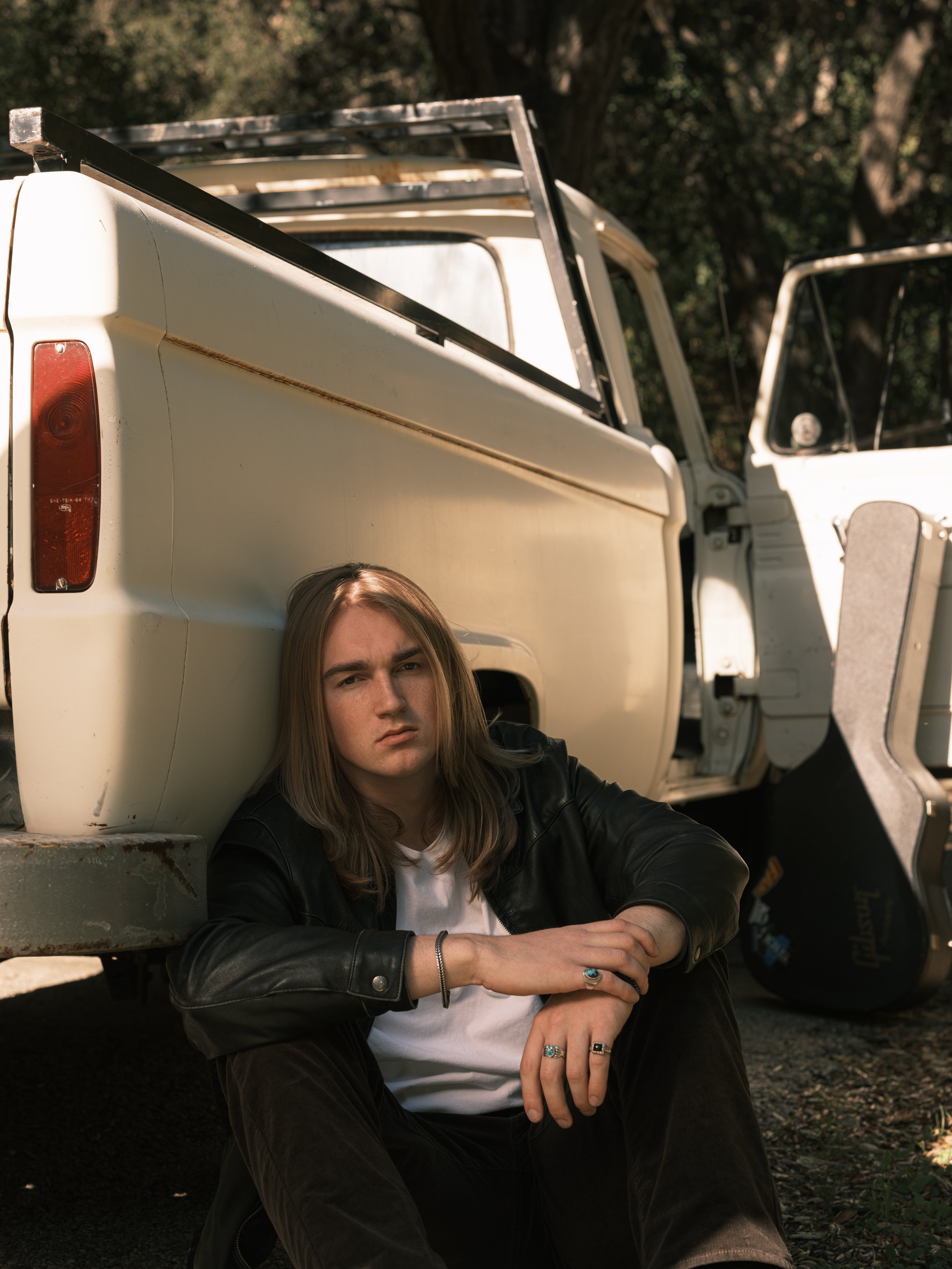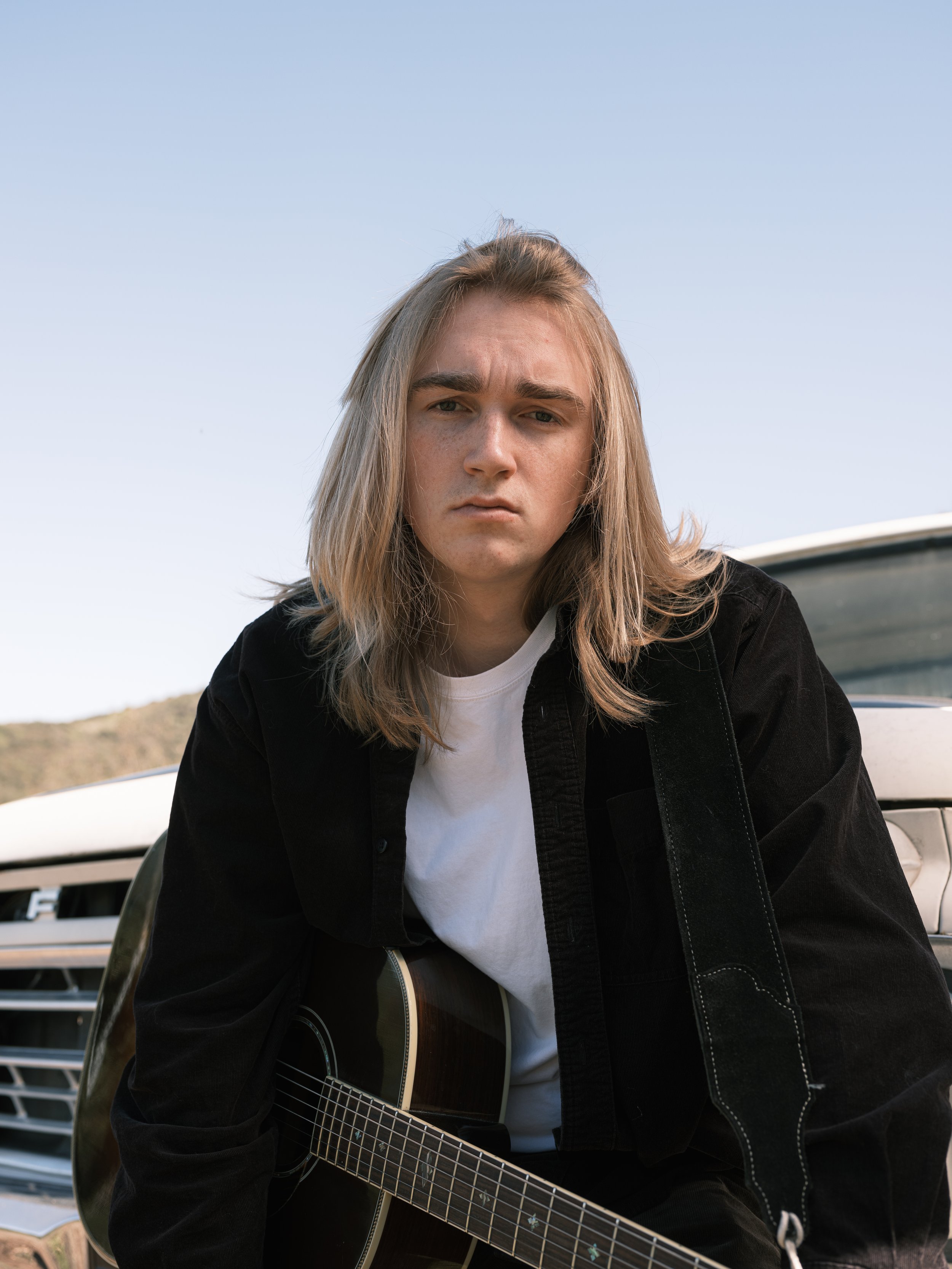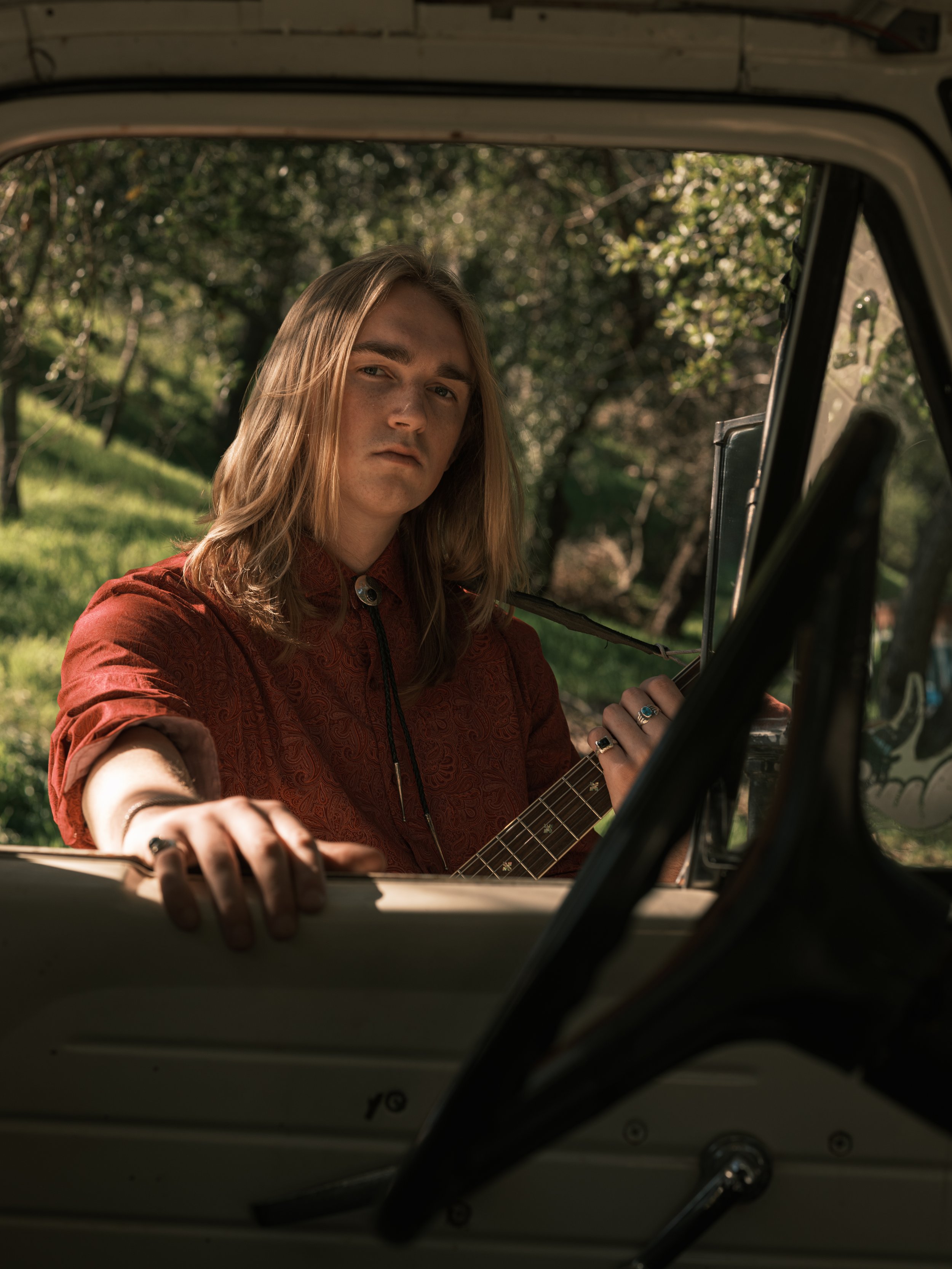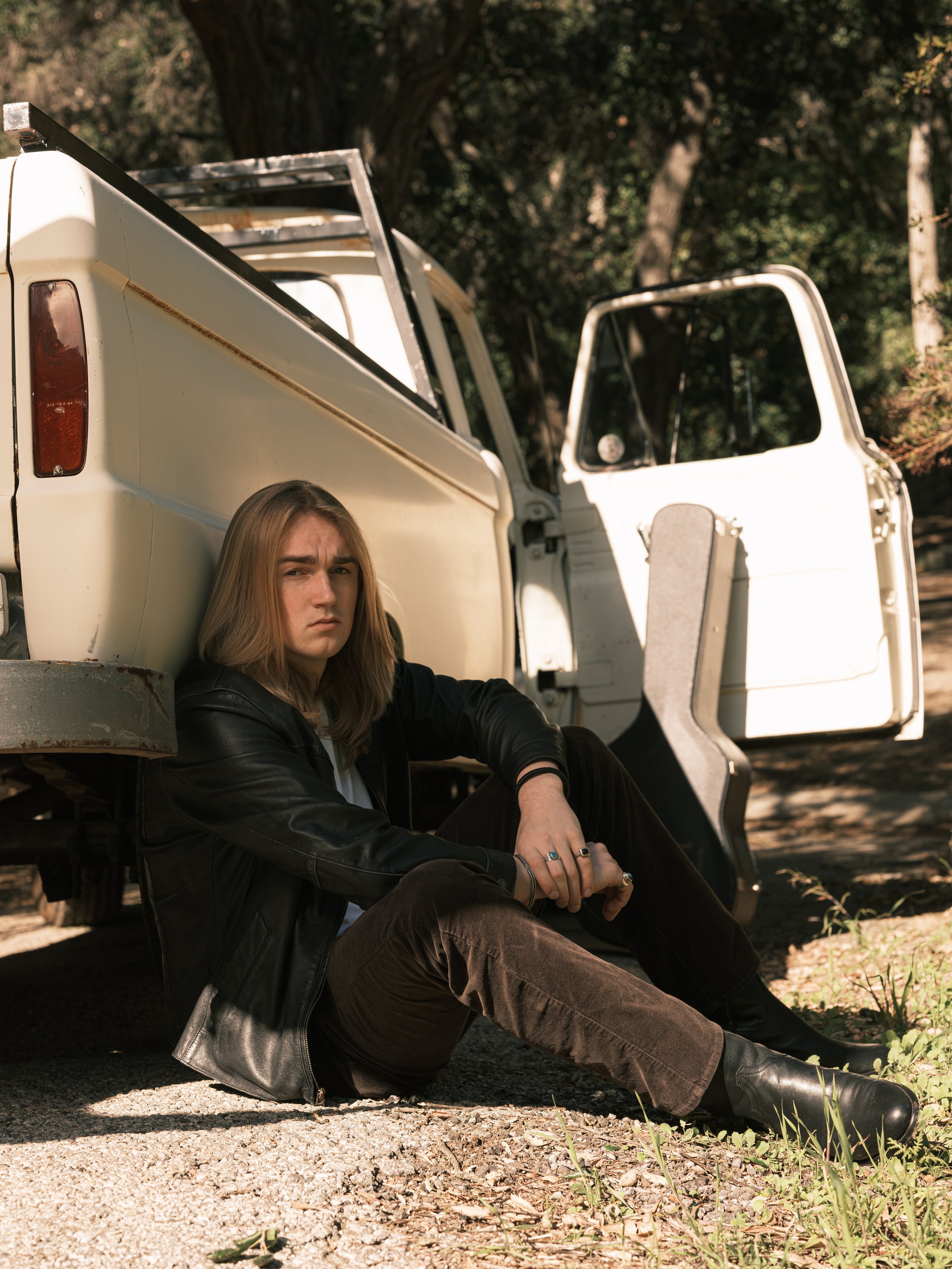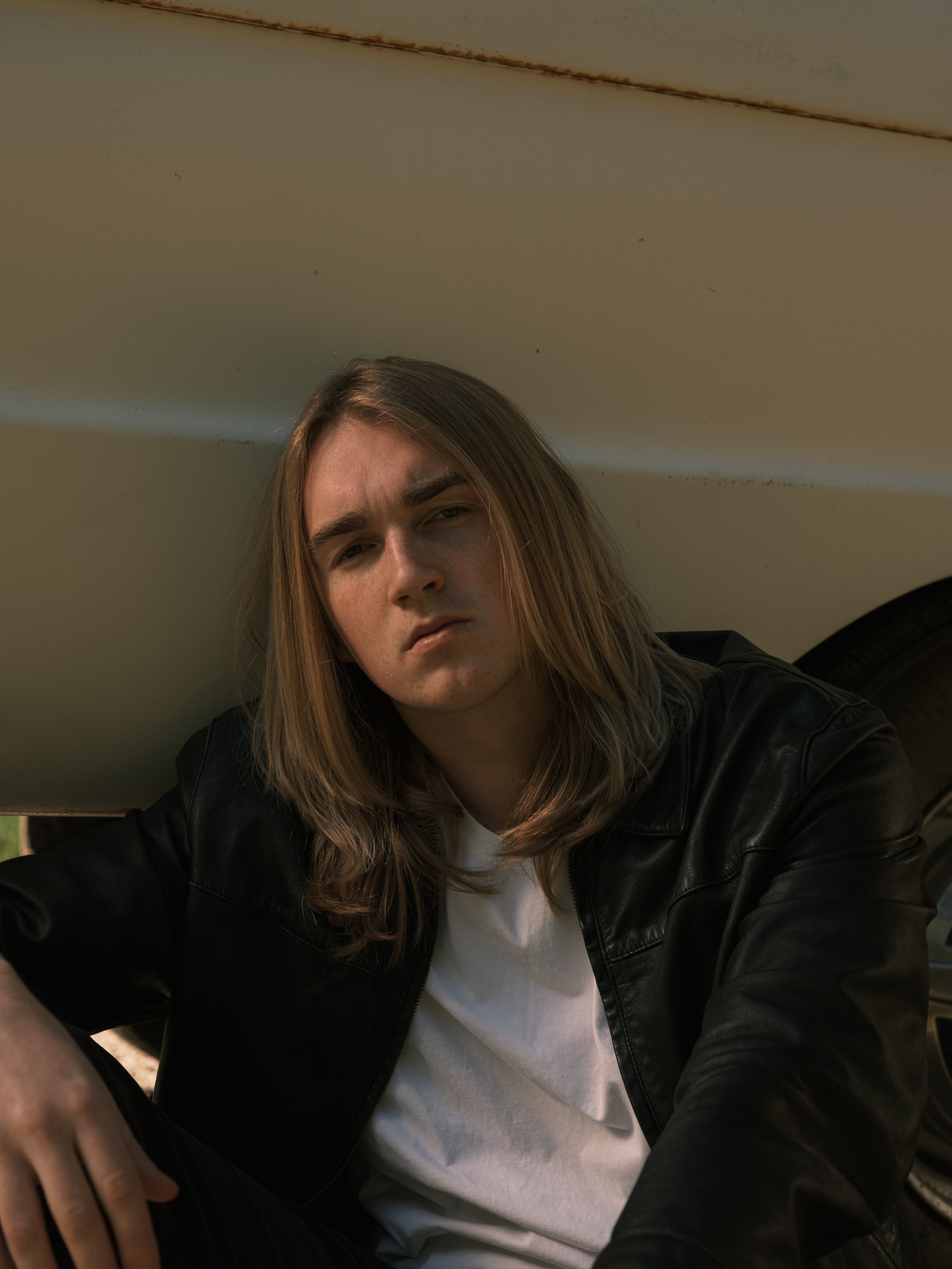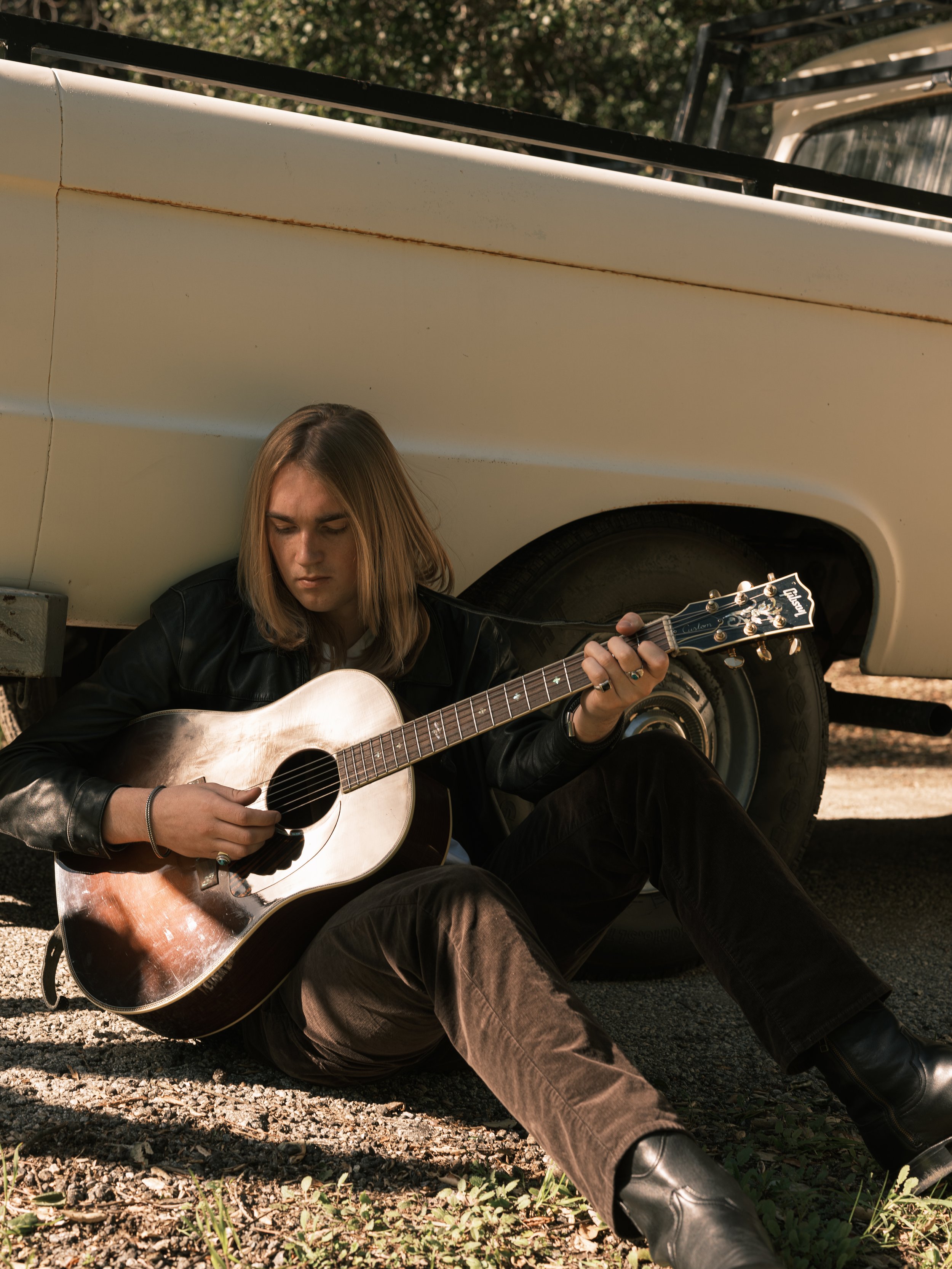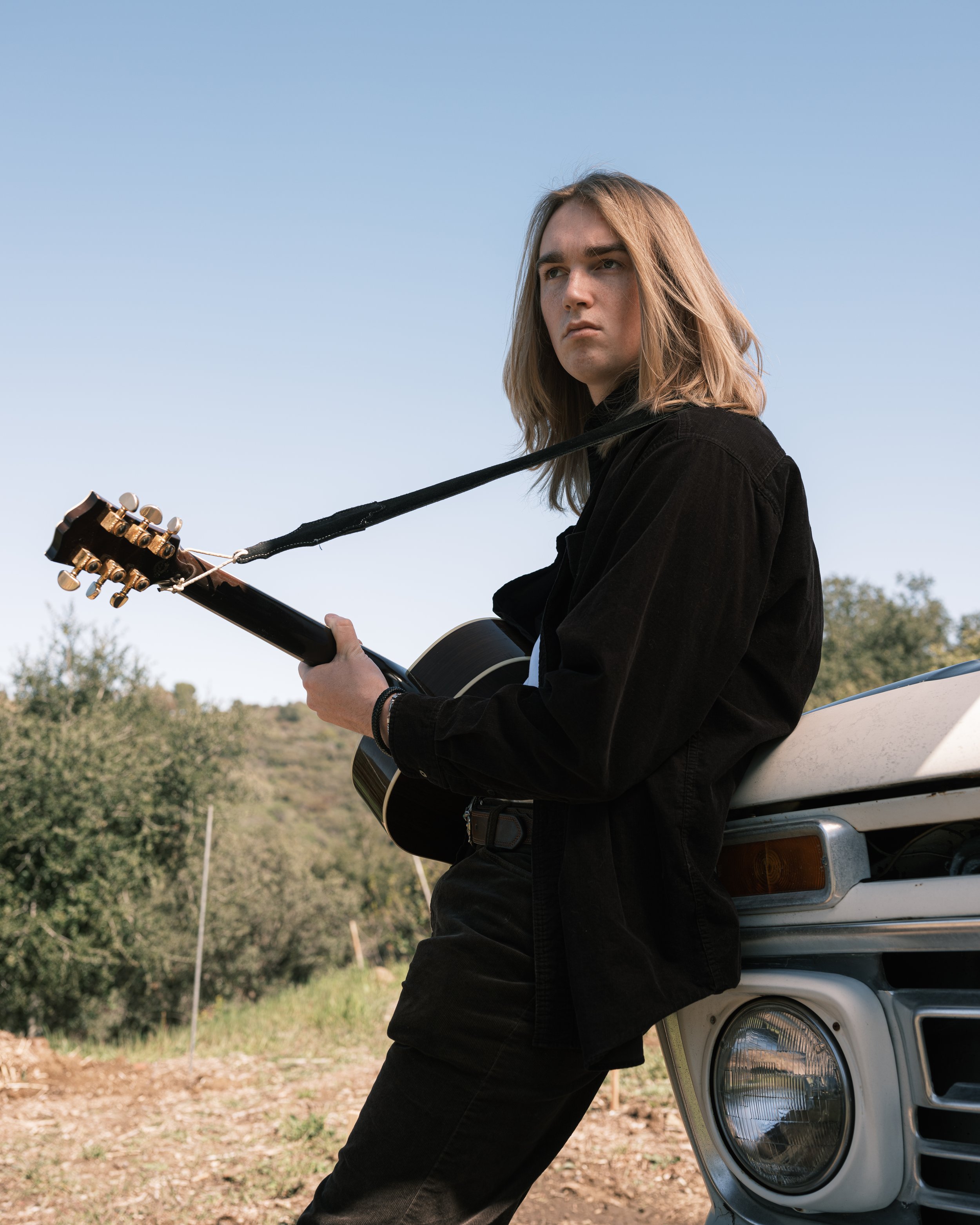Click Image to Download!
Twenty-one-year-old Cole Gallagher is a true rock ‘n’ roll storyteller. His stirring and imaginative songs, propelled by his richly expressive voice and framed within the sound of finely crafted Americana, come at you with a vivid sense of narrative, but one that’s cloaked in mystery.
“They say that the only way to understand the world around you is by looking within,” Gallagher says. “Every time I finish a song, I wonder if I could have said something differently.” He laughs. “I think that makes it hard to understand the art I create, but it keeps me entertained. To me, making music is the purest form of therapy.”
The approach is on full display on Gallagher’s debut EP, The Confluence, a bracing six-song set on which the South Pasadena resident establishes himself as a multi-faceted songwriter, singer and musician. Produced, engineered and mixed by multiple Grammy winner Vance Powell (whose credits include Phish, Chris Stapleton and Jack White, among others), the record brims with lovingly detailed arrangements and exuberant musicianship on which Gallagher lets listeners in on feelings and observations, both stormy and sentimental.
While the EP bristles with youthful energy, its songwriting reflects an artist who has spent many hours closely listening to the greats. “I’m very influenced by the big singer-songwriters from the ‘60s onward – Bob Dylan, Bruce Springsteen, John Fogerty, Tom Petty, Warren Zevon,” he says. “They were trying to make sense of the times they lived in, but when I heard them, I felt like they were speaking to me at that moment.”
He got started on his musical journey early enough. Raised in Los Angeles County, he luxuriated in his father’s extensive CD collection, chock full of classic rock (“That was basically the first part of my musical education”). His first guitar was an electric – easier for string bends – but he soon switched to an acoustic, which remains his dedicated instrument.
“At first, music was a social outlet for me,” Gallagher reflects. “I’d run around with my brothers and talk about forming a band. We even came up with band names, but neither of them actually picked up instruments. Once I started playing guitar, though, it immediately started helping me emotionally.”
In high school, the budding songwriter penned tunes at a steady clip, pouring over his lyrics. It was part free expression, part self-analysis. “I would write stuff and I’d have no idea where it came from,” Gallagher says. “That’s what fascinated me, writing something and trying to figure out its meaning. Sometimes that answer comes years later, if at all.”
It was at the South Pasadena Music Center & Conservatory where he got his first chance to play with a band. It was fun for a while, but he soon tired of their covers-only repertoire and decided to strike out solo with his own material. He knocked around Pasadena and made an impression on a local club owner, Ed Minassian, who gave him a shot at performing at his venue, The Mixx. “That was a really important moment for me,” Gallagher says. “At first, nobody wanted to hear what I was doing, but before long people really started paying attention. Performing live really sold me on the idea of being a musician. I saw how my songs could affect people and even help them.”
Following a three-year stint playing regularly at The Mixx, Gallagher took off for Nashville. On one of his first nights there, he met singer Tera Lynn Fister, who was playing a gig at Tootsie’s Lounge. She handed him a guitar, and after listening to Gallagher perform one of his originals, she ran upstairs and told the club’s owner, John Taylor, to give him a listen. “John put me to work the next day,” Gallagher says. On another night, at Kid Rock’s Big Ass Honky Tonk & Steakhouse, he performed one of his songs with the house band. Gallagher’s father recorded the moment on video, which resulted in the singer being asked to perform at a NAMM after-jam. “That was another big deal,” Gallagher says. “From there, things began to take shape.”
Through a family friend, Marc Levine, Gallagher was put in touch with Chris Sikora, lead engineer at ReAmp Studios (now Voyager Studios) in Tustin, California, who offered him a chance to record an album. Sikora then connected Gallagher to Nashville keyboard ace Jon Eldridge, who introduced the singer to Jimbo Hart and Sadler Vaden, bassist and guitarist, respectively, for Jason Isbell’s band, the 400 Unit – all of whom played on the sessions.
Once the album was finished, assistant engineer Mike Fahey asked Vance Powell to mix the tracks. The veteran record maker was so taken with Gallagher’s music that he asked him if he’d be interested in doing some more recording – with him producing. “I couldn’t believe it,” Gallagher marvels. “If it weren’t for Chris Sikora making the album with me, I wouldn’t have gotten the chance to work with the guys in the 400 Unit and Vance Powell.”
At Powell’s Sputnik Sound studio in Nashville, Gallagher reconvened with Eldridge, Hart, Vaden and the 400 Unit’s drummer, Chad Gamble, on the songs that comprise The Confluence, fleshing each tune out with a mighty webwork of sparkling guitars and swirling organ over the brawny yet nimble rhythm section. Other players include guitarist Barry Billings and drummer Tucker Flemings, and a horn section consisting of Leif Shires, Josh Scalf, Tyler Summers and Simon Yeh. Tera Lynn Fister and Kierra Bronson provided background vocals.
The record kicks off with the rugged, impressionistic anthem “Lines in the Sky,” on which Gallagher roars, “Pulling out your hair, screaming in the mirror, like Joan of Arc in flames.” Of the lyrics, he says, “It was her wearing armor. She was dressed like a man, and she made people uncomfortable because she was so strong. She had to go. I thought of the armor as the walls she puts up.”
Gallagher admits that detailing the exact meaning of his lyrics isn’t his game. Of the emotionally wrought ballad “Stumbling in the Dark” – one he delivers with a fevered growl that alternates with a sweet falsetto – he explains, “I’m not far enough away from the song to understand what it means to me. The line ‘I don’t know where the wind might blow/ darlin’, I’ll go wherever you are’ pretty much sums it up.”
“Delilah” is another song that allows for multiple interpretations. A gentle and graceful love poem ushered along by brush strokes and evocative strings, it takes you places, but Gallagher, who sings “Delilah, I’m bleeding myself dry,” offers no roadmap. “The meaning changes all the time, and every time I sing the song I think about why,” he says. “In terms of love interests and myself, whenever I open myself up to somebody, I find that I give more than I mean to – and I’m bleeding my heart dry.”
When writing the vast Tex-Mex/country gem, “Chatting Through Steel,” Gallagher heard the voice of Los Lobos singer David Hidalgo in his head, and was overjoyed when the veteran musician agreed to a studio duet. “It still seems surreal to me,” Gallagher raves. “He came to the studio with a guitar and an accordion, and his only request was a Jack Daniels and a Coke to warm up his voice. I’m so honored that he’s on my record.”
With “Sugarland,” Gallagher lived out another fantasy by recording a never-before-released song by his hero, Bruce Springsteen, and indeed, his reverential tribute to the Boss – the soulful shuffle, punchy guitar licks, carnivalesque keys and crackling horns – recalls the classic sound of the E Street Band. “From what I understand, Bruce had planned to release it in 1983, but it never happened,” says Gallagher, who found a demo of the song on a bootleg. “I had to reach out to Bruce’s team for explicit permission, and he needed to listen to it before I could move forward with the release. I honestly never thought he would say yes. Bruce is my absolute number one hero!”
“The Ocarins of Tennessee” spreads itself out majestically and extravagantly. Inspired by a car trip through the South, it finds Gallagher’s soaring vocals rising to meet Fats Kaplin’s swelling pedal steel textures. And if it feels like an epic, that’s no accident. “I was really taken with the beauty of the land during this long drive,” he says. “I remember hearing Jimbo Hart talking about fishing on Wilson Lake when he was a kid. He mentioned how the wind would blow through these ocarinas, and they would make this low drone. That stuck with me – I had these images and sounds to work with.”
On The Confluence, Gallagher makes every moment matter. There are hard-learned lessons and far-flung fantasies, songs of faith and dreams and the struggle for identity. “Making music is something I chose to do, but it’s also something I have to do,” he says. “I would be happy to play music for people every night. It doesn’t matter how many people are there or where we are. As long as I can try to make a connection with people, that’s all that matters.”


